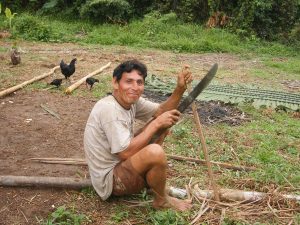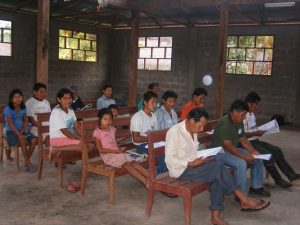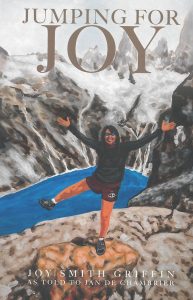
The Ashantika people of northern Peru work hard for basic survival near the Amazon River.
By Joy Smith Griffin –
“Anyone who believes in me may come and drink! For the Scriptures declare, ‘Rivers of living water will flow from his heart.’“ John 7:38, NLT
“This river is our life.”
Unspoken, yet undeniably implied, these words played out before me as I stepped gingerly onto the banks of the Amazon River in northern Peru. Having been deposited on the edge of the tropical rainforest by John, our missionary pilot, my friend Carolyn and I disembarked from the tiny, four-seat floatplane, our backpacks most likely representing more material goods than the sum total of all these precious Ashantika natives.
With some clad in rags and others in altogether nothing, young mothers were washing their little ones in the murky, dark-brown river water, while others were gathering the same in clay jugs for cooking. Young men in primitive dugout canoes were playfully splashing makeshift fishing poles in the muddy waters, angling for some piranha protein for their day’s diet. Careful to respect their privacy, we trudged on through the rainforest to our camp, a thatched roof structure surrounded by a canopy of lush green vegetation.
Reflecting on my own life’s journey that led up to this moment, my thoughts drifted several decades back to Christian camp meetings in my home state of Georgia. Every summer, my hardworking, dairy-farming parents would set aside a week to take my brother and me to a gathering with other believers for some good old-time revival meetings, fellowship around the campfire, singing gospel songs, and just plain fun. Having given my life to Jesus at the age of twelve, I was curious about going deeper in my walk with Him.
The next summer, I seized my opportunity. The missionary guest speaker had just shared a midweek message about all the unreached people groups of the world. “Did you know that there are parts of the world where people have never even heard the name of Jesus, much less been told the Good News? If you are feeling the tug of the Holy Spirit on your heart tonight to go to the unreached people of the world, to the uttermost ends of the earth, I invite you to come forward now.”
Completely unaware of anything except that I was hearing Jesus call me to go forward, I leapt out of my seat and fell before Him on that sawdust-covered floor. “Here I am, Jesus. Send me!” As I prayed to receive this commission, I had a strong visual impression of a jungle rainforest. Somehow, I knew I would see it one day.

Men and women learn about evangelism at an International Leadership Institute teaching event.
Now in the Amazon jungle, my childhood vision having just become a reality, joy exploded within me as I tearfully offered thanksgiving to God. “Thank you, Jesus, for answering my prayer! Even if you were to send me back home right now, you have fulfilled my dream! With all my heart, I want these people to know you!” Energized by my own elation, knowing that God had sent me and would be with me, I knew I could do anything through the strength Jesus would provide.
When my husband Wes and I launched the International Leadership Institute (ILI) in 1998, we believed it could accelerate the spread of the life-transforming power of the gospel through leaders of leaders empowered by the Holy Spirit. Today, there are more than 300,000 ILI alumni in 108 nations.
Equipped for foreign missionary service through my studies at Asbury Seminary, it was there I had met my friend and present travel companion, Carolyn. As a missionary kid raised in Guyana, she had longed to return to the South American rainforest of her upbringing, so she readily accepted my invitation to go to Peru. While Wes was, and is, completely supportive of my many mission endeavors, he sat this one out. “You go and I’ll pray,” he said.
So here we were! Knowing that our journey would have taken seven days by motor boat from Pukallpa, I expressed my thanks to our pilot, John, and asked him to tell us what had prompted him to become a missionary pilot. Raised in Ecuador, John’s Christian parents had become friends with now-legendary missionaries Nate Saint and Jim Elliot as they were attempting to evangelize the Huaorani Indians, a small, ferocious, unreached people group in the Ecuadorian jungle. Although Nate Saint and Jim Elliot were martyred when the Huaorani attacked and speared them to death, John’s parents were in another location when this tragedy occurred. Hearing the story of these missionaries’ selfless courage, John was determined to follow in their footsteps and went to the States to study aviation, eventually returning to his roots in South America. And now, John was helping us to spread the gospel here in the Amazon jungle.
Having been asked to speak at an evening service which other villages had been invited to attend, I was preparing my heart to listen to what the Lord had for me to share. Noticing some commotion around the compound, I saw a giant rodent the size of a small dog, something called capybaras in the Ashantika language, but which qualified as a rat in my book. Yet the natives were not fending this creature off; they were preparing him to be the main course for their evening meal! As the men dug a deep pit, threw in hot rocks from the fire, added Mr. Rat and smothered everything with banana leaves to keep in the moisture, I realized this would be my supper, too.
But there would be another delicacy on the table. A carb staple in the Ashantika tribe’s diet is yuka, a form of the cassava root, which they dig up with machetes and then relentlessly pound into submission. However, this root is so hard that in order to make it edible, everyone is given a piece to chew on until it softens. And then – oh, Lord have mercy – they spit it back into a common pot for all to enjoy. Our evening meal would be Rat ‘n Root.
Silently thanking God for all the ways he had prepared me for situations like this, I thought gratefully of one of my favorite professors at Asbury, J.T. Seamands, who taught us the importance of cultural relevance in missions. Wes and I, along with the other founders of ILI, included Culturally Relevant Evangelism as one of the eight core values of the Christian faith in ILI training. This basically means when in Rome, do as the Romans do. When in the Amazon jungle, eat rats and roots. And smile. Big. However, I did ask Jesus to help me not vomit as I swallowed it.
 My upbringing on a dairy farm also did away with any squeamishness over sleeping on cow-manure floors, eating maggots and bugs like I did in India, drinking cow’s blood in parts of Africa, you name it. I realized early on that not only my acceptance of native practices, but my participation in them, would build a bridge of trust between us. I would no longer be considered an outsider, but would become like one of them. I knew this was a key to being able to effectively share the gospel.
My upbringing on a dairy farm also did away with any squeamishness over sleeping on cow-manure floors, eating maggots and bugs like I did in India, drinking cow’s blood in parts of Africa, you name it. I realized early on that not only my acceptance of native practices, but my participation in them, would build a bridge of trust between us. I would no longer be considered an outsider, but would become like one of them. I knew this was a key to being able to effectively share the gospel.
With just one precious hour to call my own between our afternoon teaching sessions and the evening feast and service at which I’d be speaking, I decided to take a dugout canoe out on the river and talk to Jesus, since he’s always in the boat. But this one was pretty cramped, since a dugout is just a log with a big hole dug out in the middle where you sit. Grabbing a stick to serve as a paddle, I plopped down into the hole and shoved off from the shore.
“Jesus, the rest of the world doesn’t even know these people are here. But you do, and now I do. They’re unreached because it’s so hard to get to them, so I want this time to matter for eternity. I want them to know you like I know you, Jesus. Tell me what to say to them tonight.”
SPLASH! Suddenly, I heard a major disturbance in the water from the side of the river where I’d just been. Pretty sure it wasn’t the Loch Ness monster, I still had a sense of imminent danger lurking in the muddy brown water, although its opaque darkness provided the perpetrator with a worthy disguise. Knowing I couldn’t turn the dugout around too quickly or I’d capsize, I also knew Jesus was in my boat and would protect me.
“BOA! BOA!” Frenzied shouts from the natives on the river bank accompanied a geyser-like eruption from the water in the place I had just passed over. A giant, stonegray creature was rolling violently behind me – a massive anaconda! This species of snake, a type of boa constrictor, can swallow a human being whole. In fact, anacondas in India are called “cow killers” because they can literally consume a cow in a single gulp. Having seen my shadow, this humongous serpent had surfaced to make me his evening meal, but somehow Jesus kept it at bay as he guided me safely to shore.
Resounding screams erupted from those who had witnessed it from the bank of the river. Having heard stories of friends and relatives who had canoed down the river to trade bananas and never returned, my close encounter with the anaconda overwhelmed them. Not aware that this danger was so present in the river that was life to them, that provided them with water to drink as well as for cooking and bathing, they quickly became aware that I had been protected from harm in a way that could only be described as supernatural. A somber sense of awe settled over the village that night.
With the dawning of the next day came bright sunshine and an excitement in the atmosphere as I prepared to teach. Wanting to share with the students about spiritual warfare from I Peter 5:8, I began to recite that verse knowing my awesome interpreter, Carlos, would be working with me hand in glove.
“Be alert and of sober mind. Your enemy the devil prowls around like a roaring lion … ”
Panic suddenly clouded the countenance of my very competent interpreter. “Carlos, what’s wrong?” I asked in alarm. “There is no word in Ashantika for lion! I can’t describe something that doesn’t even exist for them!”
“Then just say ‘big cat!”‘ I said. “But we don’t have cats either!” he said in exasperation.
Knowing we were between a rock and a hard place, I sent a quick bullet prayer to Jesus. Immediately, the answer came.
“Your enemy the devil is like a BOA! When he sees a shadow come over the water, he tries to drown it!” With that, the Holy Spirit connected all the dots, teaching these people that, while their river may be the source of their physical water supply, only Jesus can save them forever and provide the living water that will never run dry.
News travels fast, even in the jungle, but I was still surprised to see an array of multicolored native headdresses worn by several different tribal chieftains as they floated on boats down the river, coming to a stop at our village.
“We heard that God saved the missionary from the boa! We want to know about this God!” Hallelujah! This opened the door for us to talk about Jesus being the Living Water.
Touched by the truth of God’s Word coupled with this vivid testimony of his ability to rescue us from harm, many prayed to receive Jesus that evening, surrendering their lives to him. Our prayers for the salvation of these people were answered.
Preparing for our departure to the States, we waited for John to return with the floatplane, eager to share these adventures with our pilot friend. However, the look on his face told us we wouldn’t be returning to civilization anytime soon. “I hate to tell you this, but there is a national strike in Peru of all the copper and salt mine workers. All transportation has stopped and there are armed guards everywhere. But knowing you ladies and your call to share the gospel, this might be an opportunity for you to reach another group that has never heard about Jesus. It’s about a 45-minute flight from here; the only thing is, I’m not sure we have enough fuel to get there and back.”
Excited by the possibility, Carolyn and I agreed to go. As we approached the area where John needed to land, he said, “We really need to pray. There may be people, goats, and who knows what else in the water, and then we can’t land. So be prepared to jump out of the plane and I’ll throw your bags out so I can keep the plane moving.”
As we made our debuts as stunt artists, the people on the banks stared at us, two wacko white women wearing skirts and jumping out of an airplane! But the love of Jesus speaks a universal language, and we were able to share the good news with yet another unreached people group.
Our faithful pilot John was not able to make it back to retrieve Carolyn and me, so we had to devise some other way to get ourselves back to Lima. With the strike wreaking havoc throughout Peru, I knew we would have to find a driver who was willing to take some risks. Having reserved $100 in U.S. currency for emergencies, I figured this definitely qualified as one and paid a man to drive us through the cold, dark night through an area known for bandits.
Given the state of these jungle roads, if you can even call them that, it was not surprising when our vehicle broke an axle and came to an abrupt halt. Helping our driver hoist it onto a rock for a makeshift repair, he was able to at least get the car to move again, albeit at the pace of a tortoise. Limping along in the pitch-black night, we came across another disabled vehicle, a truck that had gone off the one lane pig-trail of a road and plunged into a ravine. Some questionable-looking men surrounded it and leered at us as we slowly ambled by. Although we had nothing valuable for them to steal, our nervous driver was quickly convinced of the power of prayer.
With daybreak, we crested a hill and caught our first glimpse of Lima! Pressing on towards the airport, we were surprised to not encounter any road blocks or guards, and soon learned that the Peruvian government had lifted strike sanctions earlier that morning. Sleepless, hungry, filthy, and yet somehow altogether elated, we heaved ourselves into our airplane seats and thanked God for seeing us safely on our way home. It was only after takeoff that we learned the strike had just resumed.
Joy Smith Griffin is the co-founder, with her husband Wes, of the International Leadership Institute (ILIteam.org). Having been paralyzed from a sports injury at the age of 22, Joy’s complete confinement for 18-months led to a personal encounter with God that transformed her. She tells the story in Jumping for Joy. This article is reprinted, by permission, from that book.






0 Comments